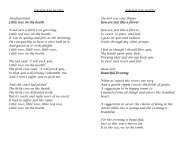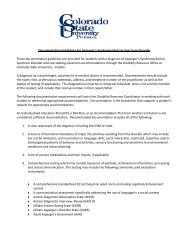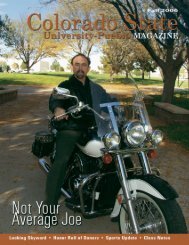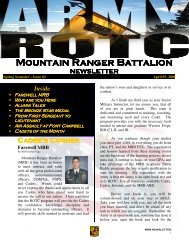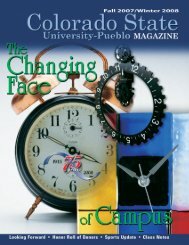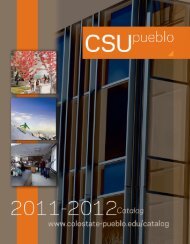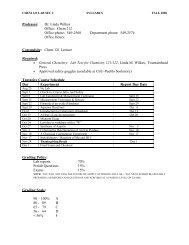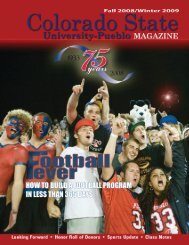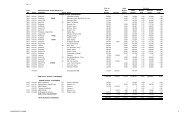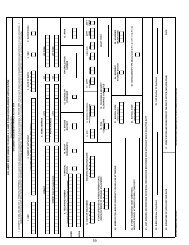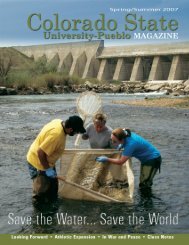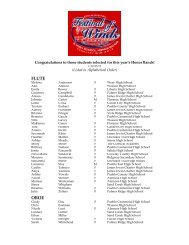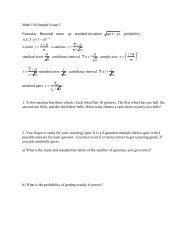2007-2008 Catalog (PDF) - Colorado State University-Pueblo
2007-2008 Catalog (PDF) - Colorado State University-Pueblo
2007-2008 Catalog (PDF) - Colorado State University-Pueblo
You also want an ePaper? Increase the reach of your titles
YUMPU automatically turns print PDFs into web optimized ePapers that Google loves.
College of Humanities and Social Sciences<br />
innovation is grounded in a traditional humanities and<br />
social sciences curriculum. Students are prepared for<br />
careers in the media and related disciplines while also<br />
being given the ethical and aesthetic foundations to<br />
make those careers meaningful.<br />
The major in Mass Communications leads to the<br />
degrees of Bachelor of Arts (BA) and Bachelor of<br />
Science (BS). A degree in Mass Communications<br />
leads to careers in journalism reporting and editing for<br />
news, features and sports; advertising copywriting,<br />
design and sales; digital video and audio production<br />
for radio, television, and the Internet; interactive multimedia<br />
application for the Internet; and strategic public<br />
relations for government, nonprofits, and business.<br />
Emphasis areas require 21 additional credit hours of<br />
course work beyond the mandatory 21-credit hour core<br />
for completion of the major. Selected professional<br />
courses may have course specific fees. Please consult<br />
your advisor.<br />
The campus newspaper is published as a laboratory<br />
tool of the Mass Communications department. The<br />
newspaper serves the students, faculty and staff of<br />
CSU-<strong>Pueblo</strong> in addition to the <strong>Pueblo</strong> community.<br />
Editorial and management positions are awarded each<br />
semester after review of all applications from qualified<br />
students. The newspaper is funded through advertising<br />
revenue. The newspaper’s advisor is a member of the<br />
Mass Communications faculty. Prerequisites: MCCNM<br />
201 and declared major or minor.<br />
KTSC-FM is licensed to CSU-<strong>Pueblo</strong> as an educational<br />
radio station by the Federal Communications<br />
Commission. Operated by the Mass Communications<br />
department, the 10,000-watt station serves a 50-mile<br />
radius of the campus. Advanced Mass Communications<br />
students are involved in daily programming,<br />
production, and news. Prerequisites: Declared major<br />
or minor in Mass Communications, MCCNM 141 and<br />
150.<br />
KTSC-TV, a Public Broadcasting full-power station<br />
affiliated with Rocky Mountain Public Broadcasting and<br />
CPB, provides laboratory training and on-campus labs<br />
for television students in the KTSC Studio. Prerequisites:<br />
Declared major or minor in Mass Communications,<br />
MCCNM 142.<br />
The Center for New Media is a cooperative effort<br />
between CSU-<strong>Pueblo</strong> and <strong>Pueblo</strong> Community College.<br />
As such, the Center provides additional resources and<br />
experiences for students, including opportunities to<br />
work in field production with a digital, six-camera<br />
production truck and advanced computer laboratories.<br />
Department Goal<br />
The primary goal of the Mass Communications Department/Center<br />
for New Media is to offer a pragmatic and<br />
professionally oriented program aimed at preparing<br />
majors for successful careers in the media and related<br />
areas and to prepare students for graduate study.<br />
Expected Student Outcomes<br />
General Requirements<br />
• Majors are required to specialize in one of five<br />
emphasis areas offered by the department:<br />
- Advertising<br />
- Broadcasting (TV and Radio Production)<br />
- New Media Studies<br />
- News Editorial-Journalism<br />
- Public Relations<br />
• Successful Mass Communications majors will<br />
demonstrate sufficient knowledge, comprehension<br />
and analytical skills by the ability to evaluate<br />
specific communication events in the proper<br />
context of their emphasis area.<br />
• Students majoring in Mass Communications must<br />
achieve a C grade or better in all MCCNM<br />
courses, both required and elective, to be eligible<br />
for graduation. Students who earn below a C in<br />
MCCNM courses will be required to repeat them<br />
to achieve the 2.0 requirement for graduation in<br />
the major.<br />
• Each faculty member will keep, in the department’s<br />
central file, a set of course outlines or<br />
syllabi that list the objectives and skills achieved<br />
during the semester. This central pool of materials<br />
describes the detailed expectations and accountability<br />
elements for the Mass Communications/<br />
Center for New Media major on a course-bycourse<br />
basis.<br />
• Consistent with general CSU-<strong>Pueblo</strong> policy, no<br />
student enrolled in Mass Communications/Center<br />
for New Media courses may accumulate unexcused<br />
absences, or arrive late for scheduled<br />
classes without faculty consultation.<br />
• The Mass Communications department believes<br />
that grades are valid quantitative indicators of<br />
student performance. Students’ GPAs in the major<br />
or minor will be used by emphasis area advisers<br />
for both formative and summary evaluations of<br />
majors and minors.<br />
139



